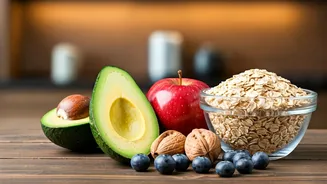Oats: Heart's Ally
Oats are recognized as a powerful tool in cholesterol management. They are packed with soluble fiber, especially beta-glucan. This fiber acts like a sponge,
absorbing cholesterol in the digestive system and preventing its absorption into the bloodstream. Including oats in your regular diet helps to reduce the levels of LDL (bad) cholesterol. Consider starting your day with a bowl of oatmeal or adding oats to your smoothies or baked goods. Eating about 1.5 cups of cooked oats per day can contribute to a significant drop in cholesterol levels over time. It's a simple, yet effective way to start improving your heart health. Incorporating oats into your breakfast routine is a tasty and practical step towards a healthier lifestyle.
Beans: Cholesterol Combatants
Beans, belonging to the legume family, are rich in soluble fiber. Similar to oats, beans bind to cholesterol in the digestive tract, preventing it from being absorbed. Different varieties of beans, such as kidney beans, black beans, and lentils, all contribute to this beneficial effect. Incorporating beans into your diet is versatile; you can add them to soups, salads, or main courses. Aim for at least a cup of cooked beans daily to experience their positive effects on cholesterol levels. Beans also provide protein and other essential nutrients, making them a well-rounded addition to a cholesterol-conscious diet. Their regular consumption can lead to reduced cholesterol and a boost to overall well-being.
Nuts: Heart-Healthy Snacks
Nuts, particularly almonds, walnuts, and pecans, are known for their heart-healthy fats and ability to help manage cholesterol. They contain monounsaturated and polyunsaturated fats, which can help lower LDL cholesterol levels. Nuts provide a convenient and satisfying snack. However, portion control is crucial, as they are calorie-dense. A handful of nuts (about 1.5 ounces) per day can offer significant benefits. Besides lowering cholesterol, nuts offer essential nutrients and antioxidants that contribute to overall cardiovascular health. Choosing nuts over processed snacks can be a positive shift towards a healthier diet and lifestyle. Make sure to choose unsalted and raw varieties of nuts.
Avocados: Cholesterol Crusaders
Avocados are packed with monounsaturated fats, which are beneficial for heart health. These fats help lower LDL cholesterol while increasing HDL (good) cholesterol levels. In addition, avocados are a good source of fiber, which aids in cholesterol management. Incorporating avocados into your diet can be as simple as adding them to salads, sandwiches, or smoothies. About one-half to one whole avocado per day can provide the necessary benefits. Avocados are also rich in vitamins, minerals, and antioxidants, further supporting heart health. The creamy texture and mild flavor of avocados make them a delightful addition to any meal, enhancing both taste and nutritional value.
Fatty Fish: Omega-3 Power
Fatty fish, such as salmon, mackerel, and sardines, are rich sources of omega-3 fatty acids. These essential fats are known for their ability to lower triglyceride levels, another type of fat in the blood, and slightly raise HDL cholesterol. Omega-3s also help to reduce inflammation, benefiting heart health. Aim to include at least two servings of fatty fish per week in your diet. This can be achieved by grilling, baking, or pan-frying the fish. Not only do fatty fish support a healthy cholesterol profile, but they also provide essential nutrients, such as vitamin D and protein. Incorporating fatty fish into your diet is a flavorful and effective way to improve your heart health and overall well-being.














